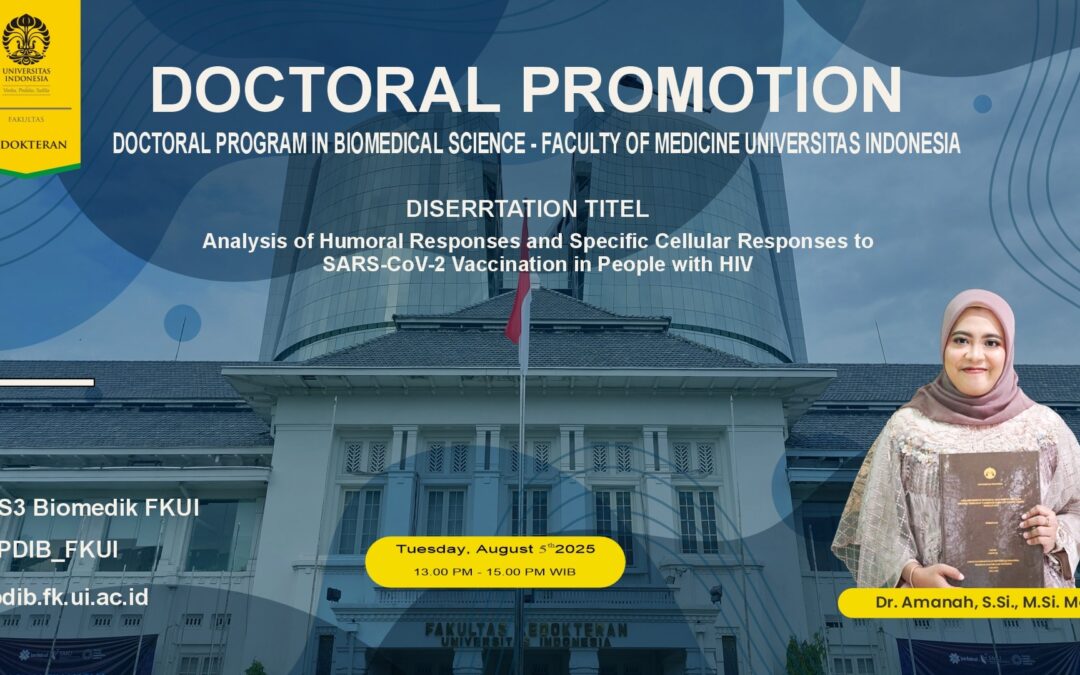The COVID-19 pandemic has shown us how important it is to prepare our immune systems for the threat of infection, which can strike at any time. For people living with HIV (PLHIV), this challenge is even greater because their immune systems are already more vulnerable. Vaccination is one of the best ways to protect themselves, but what about their immune response to vaccines? Do they have the same protection as healthy individuals? If so, what type of vaccine is suitable for them?
Research conducted by Amanah, S.Si., M.Si.Med, a lecturer at the Faculty of Medicine, University of Yogyakarta (UGJ) and a doctoral candidate at the Faculty of Medicine, University of Indonesia (UI), seeks to answer these questions. This research will not only benefit our understanding of COVID-19, but also help us prepare for future pandemics or other infectious diseases. Let’s take a closer look at the results of this study (full journal link: https://www.mdpi.com/22279059/12/9/2115 ) and what we can learn from it about how our immune cells work, and how vaccines can strengthen our body’s defenses, especially for people living with HIV.
What Was Done in This Study?
This study involved 41 people living with HIV who were already on antiretroviral therapy (ART) and 31 healthy, HIV-negative people as a control group. Both groups received the SARS-CoV-2 vaccine, either an mRNA vaccine or an inactivated vaccine.
Researchers measured two key factors in the immune response: levels of SARS-CoV-2-specific antibodies and the cytokines IL-2 and IFN-γ in the blood. The results of this study provide important insights not only into how vaccines work in people living with HIV, but can also serve as a reference for dealing with pandemics or other infectious diseases.
The Immune System: What Should We Know?
To understand how vaccines work in our bodies, it’s important to understand how the immune system functions. The immune system is made up of various cells that work together to protect us from infection. The two main types of immune cells involved in the vaccine response are B cells and T cells.
• B cells are responsible for producing antibodies, which are molecules that can recognize and bind to viruses or bacteria, preventing them from entering our cells. When the body is exposed to the SARS-CoV-2 virus, B cells will produce specific antibodies that can neutralize the virus.
• T cells, on the other hand, play a role in recognizing infected body cells and destroying them. There are two main types of T cells involved in the immune response: CD4 T cells, which help coordinate the entire immune response, and CD8 T cells, which destroy infected cells. HIV attacks CD4 T cells, which can weaken the immune system.
• Cytokines, such as IL-2 and IFN-γ, are “chemical messengers” that tell other immune cells to work harder and speed up the body’s response to infection.
How Do Immune Cells Work After Vaccination?
Vaccines work by triggering the body’s immune response without causing infection themselves. Vaccines contain fragments or parts of the virus (such as the spike protein on SARS-CoV-2) that trigger the immune system to recognize and prepare defenses against the actual virus.
When a person is vaccinated, B cells recognize the protein in the vaccine and begin producing specific antibodies that can recognize the virus if exposed to it in the future. Furthermore, the vaccine also stimulates T cells to remember the virus and mount a faster and stronger response if the body is exposed again.In people living with HIV, their immune systems are weaker because HIV attacks CD4 T cells, which play a crucial role in regulating the immune response. However, even with lower CD4 T cell counts, vaccination can still provide significant protection.
Key Finding: mRNA Vaccines Provide More Protection for People Living with HIV
The results of this study indicate that mRNA vaccines induce a stronger immune response in people living with HIV, particularly in terms of anti-SARS-CoV-2 antibodies. People living with HIV who received the mRNA vaccine had higher levels of immunity after the first dose compared to those who received the inactivated vaccine. This indicates that the mRNA vaccine can be used in this group of people living with HIV to protect against SARS-CoV-2 infection.
Conversely, the inactivated vaccine showed a significant increase in the cytokines IL-2 and IFN-γ after the first dose, although this did not correlate with SARS-CoV-2-specific antibodies. This indicates post-vaccination cellular immune activation, but due to limitations in the testing system, this activation is not fully specific to SARS-CoV-2. It is recommended that the CD4 count of people living with HIV be used as a consideration when administering the vaccine. People living with HIV with a CD4 count >200 cells/mm 3 exhibit a better immune response than those with a CD4 count >200 cells/mm 3.
Conclusion: Vaccination is Key to Protection, for Both People Living with HIV and the General Public
Vaccination is a crucial step in protecting ourselves from potentially fatal infections. Not just for those living with HIV, but for everyone.With this knowledge, we can move toward a healthier and safer future from the ever-evolving threat of infectious diseases. This study provides strong evidence that SARS-CoV-2 vaccination can protect people living with HIV. The mRNA vaccine, in particular, demonstrated a stronger immune response and could become the primary choice for this group in the future for other diseases. The results of this study can be used as a reference for vaccinating people living with HIV in the face of potential pandemics or re-emerging diseases in the future.

